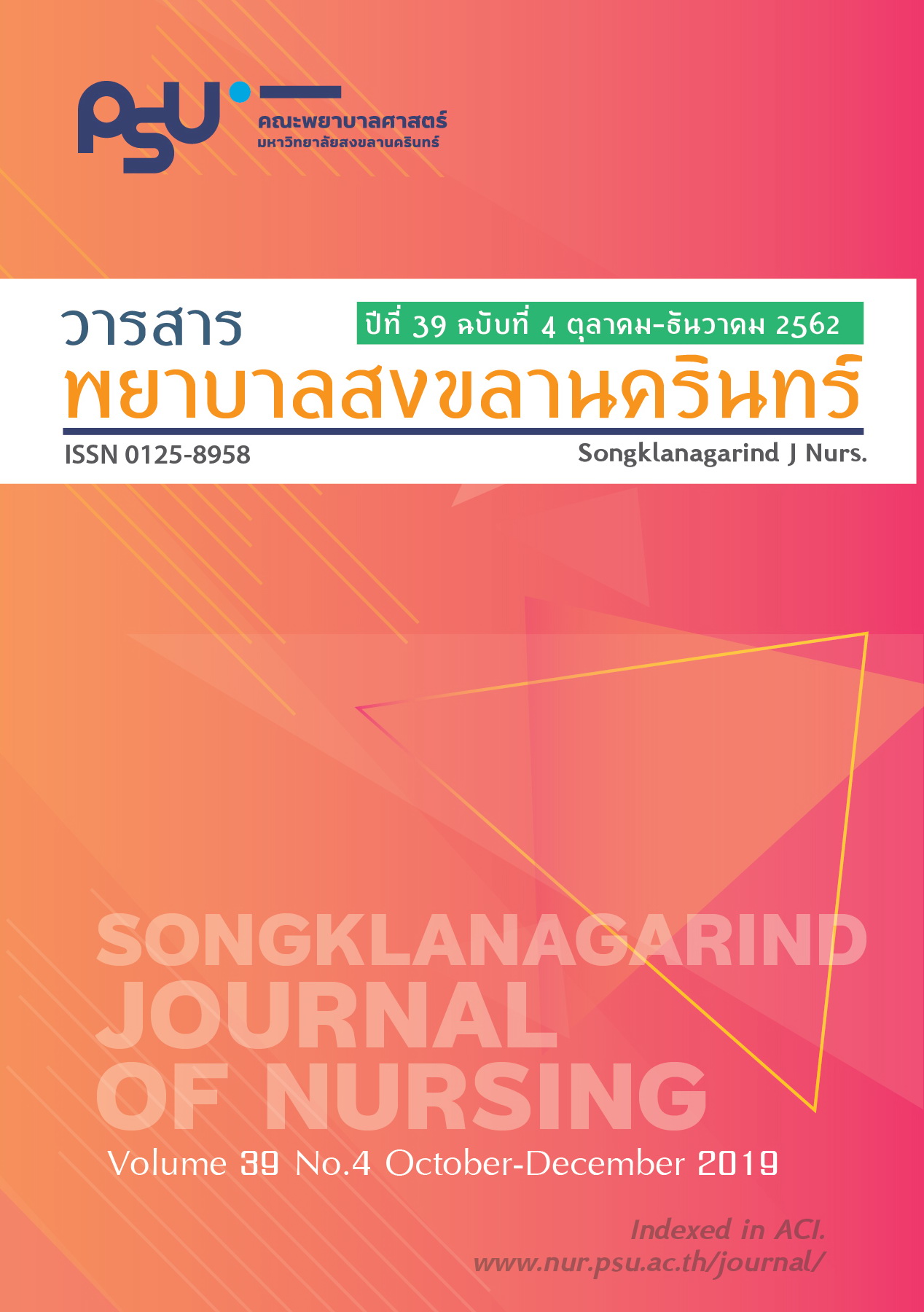The Lived Experiences of Thai Buddhist Family Members in Decision Making for Withholding or Withdrawing Life Sustaining Treatments for Critically Ill Patients in Terminal Stage
Main Article Content
Abstract
The purpose of this study was to describe the lived experiences of Thai Buddhist family members in decision making of withholding or withdrawing life-sustaining treatment for critically ill patients at the end of life. Hermeneutic phenomenology was used in this study. Participants were 10 Thai Buddhist family members in Songkhla province who had the experiences under study. Data were collected during March to December, 2017 using individual in-depth individual interviews. Data were analyzed using van Manen’s approach. Trustworthiness was established following Lincoln and Guba’s criteria.
The findings revealed 7 thematic categories reflected within 5 lived-worlds of van Manen. 1) Lived space was as if being alone in the dark; 2) lived body: must be conscious, must accept the nature of life and law of karma; 3) lived time: having hope but accepting the truth; 4) lived relations: seeking spiritual refuge, recognizing patient’s mind and body; and 5) lived things: technologies at the end of life.
The findings in this study provide understanding of the experiences of Thai Buddhist family members in decision making of withholding or withdrawing life-sustaining treatment for critically ill patients at the end of life. The findings can be guidance for physicians and nurses in helping and supporting the patients’ family members in making a decision at the end of life.
Article Details
References
2. Detering KM, Hancock AD, Reade MC, Silvester W. The impact of advance care planning on end of life care in elderly patients: randomised controlled trial. BMJ. 2010; 340: c1345.
3. Klinmalee P. Surrogates’ decision making and its’ outcomes regarding treatments for Buddhist critically ill patients at the end stage of life [dissertation] [Songkhla]: Prince of Songkla University; 2016. 180 p.
4. Chiarchiaro J, Buddadhumaruk P, Arnold RM, White DB. Prior advance care planning is associated with less decisional conflict among surrogates for critically ill patients. Ann Am Thorac Soc. 2015; 12(10): 1528-33.
5. Wendler D, Rid A. Systematic review: The effect on surrogates of making treatment decisions for others. Ann Intern Med. 2011; 154(5): 336-46.
6. Meeker MA, Jezewski MA. Metasynthesis: Withdrawing life-sustaining treatments: The experience of family decision-makers. J Clin Nurs. 2009; 18(2): 163-73.
7. Romain M, Sprung CL. End-of-life practices in the intensive care unit: The importance of geography, religion, religious affiliation, and culture. Rambam Maimonides Med J. 2014; 5(1): e0003.
8. National Statistical Office. Percentage of population aged 13 and over by religion and region 2014. Available from http://service.nso.go.th/nso/nsopublish/pubs/e-book/esyb58/index.html#223/z
9. Phra Visalo P. Good death. In: Phra Visalo P, editor. Over death from crisis to opportunity. 5 th ed. Bangkok: Samlada Ltd.; 2011. Thai.
10. Nijinikaree N, Chaowalit A, Hatthakit U. The perspectives of end-of-life decisions in chronically ill Thai Muslim patients in the five border provinces of southern Thailand. Songkla Med J. 2008; 26(5), 431-9. Thai.
11. Martin H. What calls for thinking? in basic writings. San Francisco: Harper Collins; 1992.
12. van Manen M. Researching lived experience: Human science for an action sensitive pedagogy: State University of New York Press; 1990.
13. van Manen M. Phenomenology of practice: Meaning-giving methods in phenomenological research and writing: Left Coast Press; 2014.
14. Lincoln YS & Guba EG. Naturalistic inquiry. Newbury Park: Sage; 1985.
15. White DB. Rethinking interventions to improve surrogate decision making in intensive care units. Am J Crit Care. 2011; 20(3): 252-7.
16. Lind R, Lorem GF, Nortvedt P, et al. Intensive care nurses’ involvement in the end-of-life process-perspectives of relatives. Nurs Ethics. 2012; 19(5): 666-76.
17. Mekthawornwathana T. The comprehensive meanings of krengchai and the important aspects of Thai culture. J NIDA Development. 2012; 52(1): 235-263. Thai.
18. Bhikkhu P. Dhamma 4 items: Mindfulness wisdom conscience meditation. Bangkok: Tathata publishish. 2006. Thai.
19. Mettanonto N. Dhamma in palliative care. In: Mettanonto N, editor. 5 Religions in palliative care. 2nd ed. Bangkok: Chivantarak club. 2006. Thai.
20. Neuanoi J. Decision of patients and surrogates on treatments at the end of life. [dissertation] [Songkhla]: Prince of Songkhla University; 2005.187 p.
21. Gries CJ, Curtis JR, Wall RJ, et al. Family member satisfaction with end-of-life decision-making in the intensive care unit. Chest. 2008; 133(3): 704-12.
22. Phra Brahmagunabhorn (P.A. Payutto). Buddha-dharma (extended edition). 39 th ed. Bangkok: Mahachulalongkornrajavidyalaya University; 2014. Thai.
23. Morita T, Ikenaga M, Adachi I, et al. Concerns of family members of patients receiving palliative sedation therapy. Support Care Cancer. 2004; 12(12): 885-9.
24. Kunsongkeit W. Spirituality in east and west perspectiives. J Nurs Burapha. 2008; 16(1): 1-8. Thai.
25. Uppanisakorn S, Boonyarat J. Experiences of family members of critically ill patients who received responses to their spiritual needs in a medical intensive care unit. Songklanagarind J Nurs. 2013; 33(3): 37-50. Thai.
26. Wechmaleenon V. Death note include words and meaning for good life and die peacefully. Bangkok: Samlada Ltd. 2014. Thai.
27. Kongsuwan W, Chaipetch O, Matchim Y. Thai Buddhist families’ perspective of a peaceful death in ICUs. Nurs Crit Care. 2012; 17(3): 151-9.
28. Kongsuwan W. Nursing for critically ill patients at the end stage of life with technology. Songkhla: Chanmeung print. 2015. Thai.
29. Silveira MJ, Kim SYH, Langa KM. Advance directives and outcomes of surrogate decision making before death. New Engl J Med. 2010; 362(13): 1211-8.
30. Kompanje EJ, van der Hoven B, Bakker J. Anticipation of distress after discontinuation of mechanical ventilation in the ICU at the end of life. Intens Care Med. 2008; 34(9): 1593-9.


